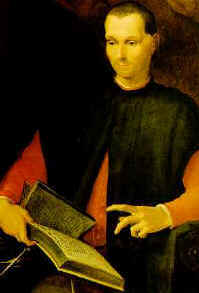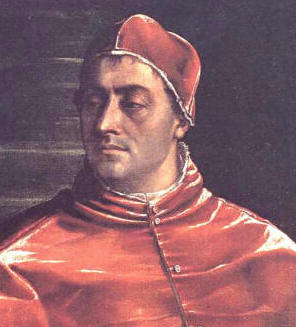
Niccolò Machiavelli, 1469-1527
|
Niccolò Machiavelli, 1469-1527 |
Machiavelli's The Prince and his Political Thought
The Prince, Discourses, Mandragola
(a play),
History of Florence, Letters
Age 29: Florentine Secretary in charge of diplomatic correspondence.
1498-1512: Many diplomatic missions to Rome, France, and other Italian city states.
1502 Machiavelli was sent to the court of Cesare Borgia
where Leonardo da Vinci was working as a military engineer. Borgia, the son of Pope
Alexander VI (1492-1503) had been a cardinal at 17 but renounced his vows.
The Medici return to power in 1512, and
Machiavelli is exiled on his farm
in San Casciano near Florence. He writes the Prince ca. 1516-1520.
| Mandragola was written in 1518 for his mistress, Barbara Raffacanti Salutati. The root of the mandrake. |
His Politics: Republic, Mixed Monarchy; Machiavelli had discussed Republics in the Discourses; The Age of Republics was drawing to a close.
"The ends justify the means" Role of Morality in Politics
 Mandragola and the Prince:
Virtù (Strength, Vigor, Valor) can overcome Fortuna (Fortune).
Mandragola and the Prince:
Virtù (Strength, Vigor, Valor) can overcome Fortuna (Fortune).
Friar Timoteo: "The end must be
looked to in all things" Mandragola, Act 3, scene 11.
Ligurio: "Tu, io, e denari, la cattività nostra, la loro" (You, me, and
money; our wickedness and theirs) Mandragola, Act 2, scene 6
Tried
to get a position at the papal court.
Important Points in Machiavelli's Thought
1. Superiority of the state over the
individual and private rights
2. Personal bonds of feudalism completely replaced by the impersonal bond of a person
to an institution
3. Evil of Papal States
4. Machiavelli does not distinguish between right and wrong government
5. Condottieri, Citizen armies
6. Leader must have Virtù; a moral code is not
important (Cesare
Borgia and Remirro de Orco)
| The Political Situation in the Mediterranean | Map of Northern Italian City States in 1454 |
Machiavelli the Writer of Letters
| Letter One | Letter Two | Letter Three |